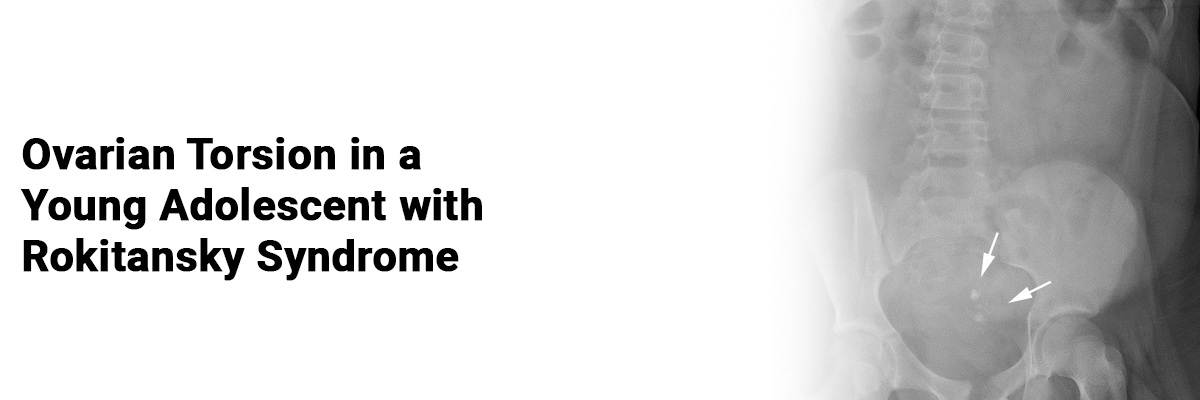
Ovarian Torsion in a Young Adolescent with MRKH Syndrome
A 12-year-old girl complained of lower abdominal and right iliac fossa pain, accompanied by vomiting. She had no fever, chills, urinary symptoms, or diarrhea.
Her medical history was unremarkable, with no history of menstruation, with thelarche at the age of 10 years and adrenarche at 11 years. Initial blood tests, including blood count, ESR, and CRP, were normal, leading to a diagnosis of mild appendicitis.
However, as her pain worsened over the following days, an abdominal ultrasound was performed. This revealed a cyst with mixed echogenicity, measuring 6 × 4 cm, in the midline of the pelvis with minimal free fluid. The sonographer also noted the inability to visualize the uterus, while the upper abdominal organs appeared normal. A surgical consultation was sought, owing to the suspecting ovarian torsion of a cystic ovary. Hence, the patient was admitted.
Upon physical examination, the girl was in significant pain and appeared anxious. Abdominal examination showed a treatable abdomen with rebound pain and normal bowel sounds. Her external genitalia were normal. A pelvic exam with a cotton swab revealed a blind-ending vagina, 1 cm deep. A rectal examination detected a tense, elastic, painful mass in the pelvis, approximately 6 cm in diameter, with no blood in the stool.
Given the clinical presentation, immediate surgical exploration was indicated. Laparoscopy confirmed right ovarian torsion with the tube, with the ovary twisted 180°. The ovarian tissue appeared viable. The uterus was absent, replaced by two small, non-cavitated rudimentary horns joined by a fibrous band separating the bladder from the Douglas cavity. The right ovary and tube were untwisted, the ovarian cyst was enucleated, and the ovarian parenchyma was gently coagulated and fixed to the right pelvic sidewall.
The surgery was uncomplicated, and the patient recovered fully. Pathology confirmed a simple cyst of the right ovary. Follow-up examinations revealed normal spinal anatomy and a 46,XX karyotype.
This case illustrates a patient with Mayer-Rokitansky-Küster-Hauser (MRKH) syndrome and ovarian torsion – a situation likely due to the increased mobility of the ovaries in Müllerian agenesis. Clinicians should be aware of this association to ensure early intervention if ovarian torsion is suspected.
Source: Fedele F, Esposito G, Busnelli A, et al. Case Reports in Obstetrics and Gynecology. 2024;2024(1):1305476.














Please login to comment on this article